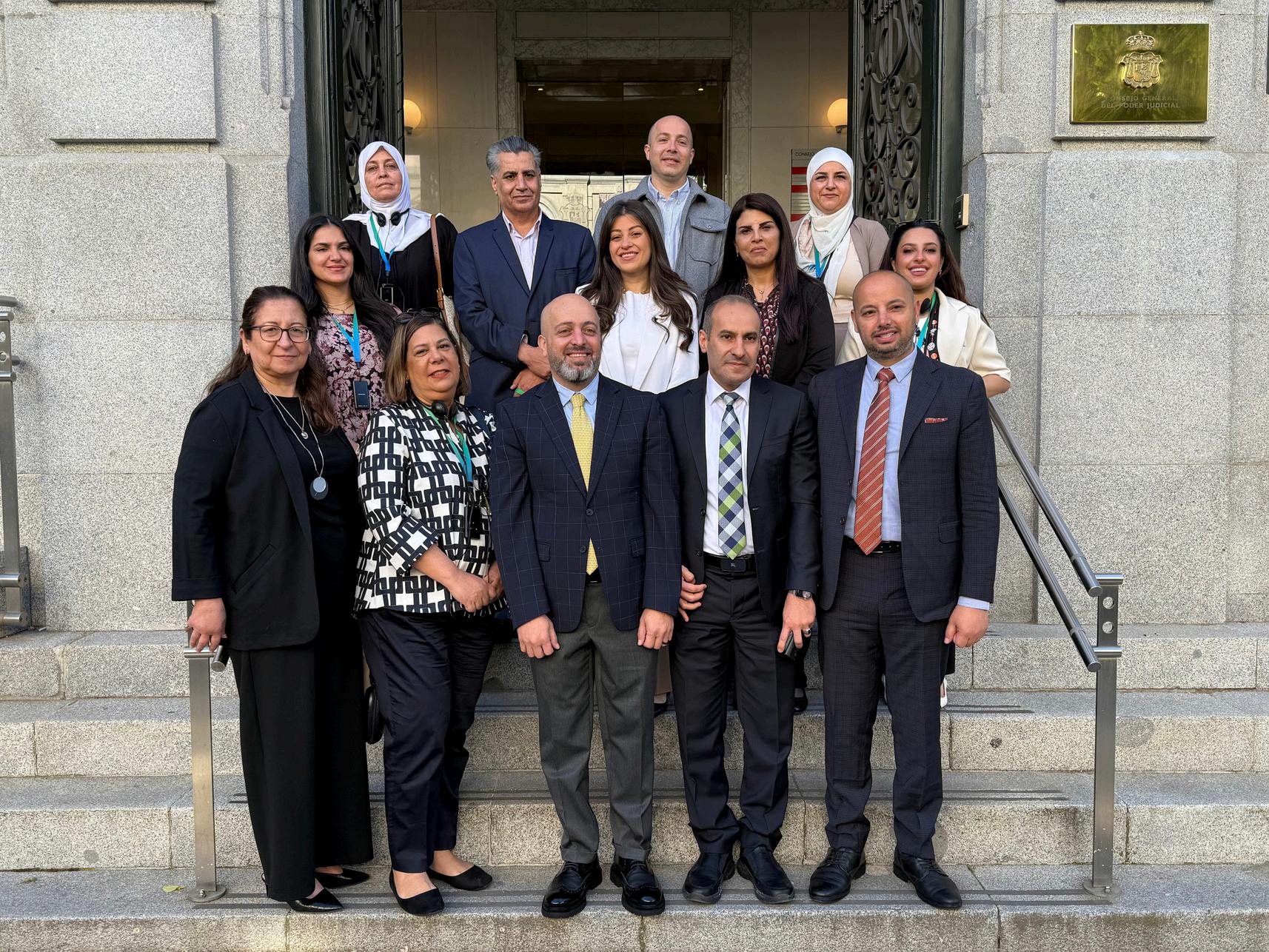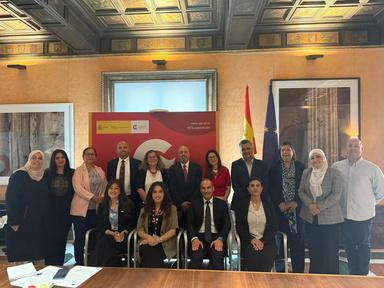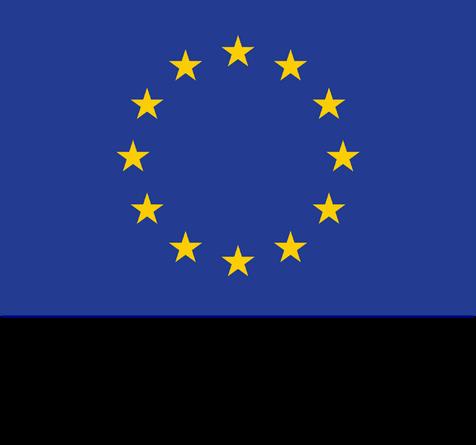InAction
ThestudytourinMadrid(Spain)
AECIDconductedastudytourinSpainfromMay18thto24th,for12participants.Theaimofthestudy tourtoMadridistoofferparticipantstheopportunitytogainvaluableinsightsintoSpanishpolicies, programs,andinitiativesfocusedontheprotectionandpreventionofGBV Participantsengaged withkeypublicinstitutions,includingtheMinistryofEquality,theWomen’sInstitute,theGovernment DelegationagainstGenderViolence,theStateObservatoryonViolenceagainstWomen,andthe016 hotline The tour also highlighted the comprehensive services available to GBV victims and survivors in Spain. Additionally, participants shared their experiences from Jordan, focusing on the “One-stopshop”model,andexchangedlessonslearnedandstrategiesforaddressingGBVintheir respectivecountries



TheknowledgeexchangewithSpainofferedrichinsightsintokey elementsofitsGBVpreventionandresponsemodel.Centralto Spain’sapproachisacoordinated,survivor-centeredsystem, engagingmultiplelevelsandsectors fromhealthandsocial servicestojusticeandlawenforcement Servicesarerisk-based andcontextualized,ensuringtailoredsupportforeachsurvivor. Data is treated as a strategic asset, driving policy, monitoring, and resource allocation. Strong legal and policy frameworks underpinthesystem,whiletechnologyandinnovationenhance protectionandaccessibility
Importantly, Spain’s model is supported by long-term institutionalcommitmentandcontinuouscapacitybuildingat all levels national, regional, and local. The active role of civil society, alongside institutionalized public-private partnerships, ensures a whole-of-society approach to ending GBV. These learnings provide valuable inspiration for strengthening GBV systemsinJordanandothercontexts.
IFH organized three medical campaigns in collaborationwithlocalschoolsandtheJordan Valley Crossing Charity Association. These campaigns provided essential health services to underserved communities and raised awarenessaboutaccessiblehealthcare.
JCLA conducted 42 legal awareness sessions, reaching1,216beneficiaries,themajorityofwhom were females and Jordanians. These sessions took place across the following locations: 10 in Irbid,17inAmman,11inZarqa,and4inKarak
TheJusticeCenterforLegalAid(JCLA)launchedthe"ViolenceAgainstWomenintheWorkplace" podcasttoaddresstheissueofworkplaceviolence Thepodcastexplored workplaceviolations,their impacts,andpotentialsolutions.FeaturingalegaladvisorfromJCLA,itcoveredtopicssuchaslabor law, maternity rights, employer responsibilities, and the economic consequences of workplace violence. Thecampaignreached204Kpeopleacrosssocialmediaplatforms
JCLAprovided498legalservicesto 424 survivors, including 351 noncourt services and 147 in-court services, benefiting individuals of various nationalities, including JordaniansandSyrians.
SOSprovidedshelterandsupportservicesto44 survivors, consisting of 20 women and 24 children, across Amman, Irbid, and Aqaba villages Comprehensive psychological assessments were conducted to identify their needs and challenges 98 sessions took place in Amman, focusing on emotional release, trauma recovery, self-esteem, communication, stress management,decision-making,andgoalsetting
IFH,FGAC,andTWCSprovidedcasemanagement(CM)andpsychosocialsupport(PSS)servicesto a total of 117 new cases, addressing various forms of GBV and related challenges. IFH delivered comprehensive CM services to 32 new survivors, while FGAC supported 36 new cases, focusing on customizedcasemanagementandPSSservices TWCSserved49newcases,withawidedistribution acrossallagegroups.
Her journey to safety began when a local community organization referred her to the InstituteforFamilyHealth(IFH)inZarqa
There, a compassionate case manager welcomed her and initiated an assessment of her situation Leila had already reported the abusetotheFamilyProtectionDepartment,and because of the threat to her and her children’s safety,theIFHteamtookimmediateactionand referredLeilaandherchildrentoSOSChildren’s Villages, where they were provided with safe shelter Meanwhile,herabusivehusband,realizing thelegalconsequencesofhisactions,fledback toSyria.
At IFH Zarqa, Leila received, individual psychological support sessions, legal referrals through the Justice Center for Legal Aid to initiate divorce proceedings, and coordinated shelter services to protect her and her children fromfurtherharm.
When it became safe to leave the shelter, Leila chosetomovetoIrbidwhereshehopedtogeta fresh start. Through a referral from the Zarqa clinic,shecontinuedreceivingsupportattheIFH Irbidclinic.
In Irbid, she underwent a new round of case management. Her ongoing medical issues were addressedwithpropertreatment,andshebegan monthly check-ups that gradually restored her health
Her children were referred to psychological support services, helping them slowly emerge fromthetraumatheyhadendured
Witheachpassingday, Leila’sstrengthgrew At IFH Irbid, she embarked on a journey of psychological recovery. She began intensive therapy sessions and with the help of her counselor, she rebuilt a sense of safety and the self-confidencethatshehadoncelost
Her family had initially opposed her decision to divorce, but as the final court ruling for divorce was issued, her family gradually came to terms with her decision, Leila’s transformation became more visible She began setting boundaries, standingtall,andreclaimingherdignity.
EmpoweredbytheunwaveringsupportoftheIFH team, Leila took her final step toward independence With financial assistance, she found employment using her own sewing skills. Thisjobbroughtherincomeandarestorationof heragencyandautonomy.
Today, Leila is more resilient Her life is no longer defined by violence or fear She has built a life centered on safety, respect, and self-reliance, offeringherchildrenabetterfuture.












































